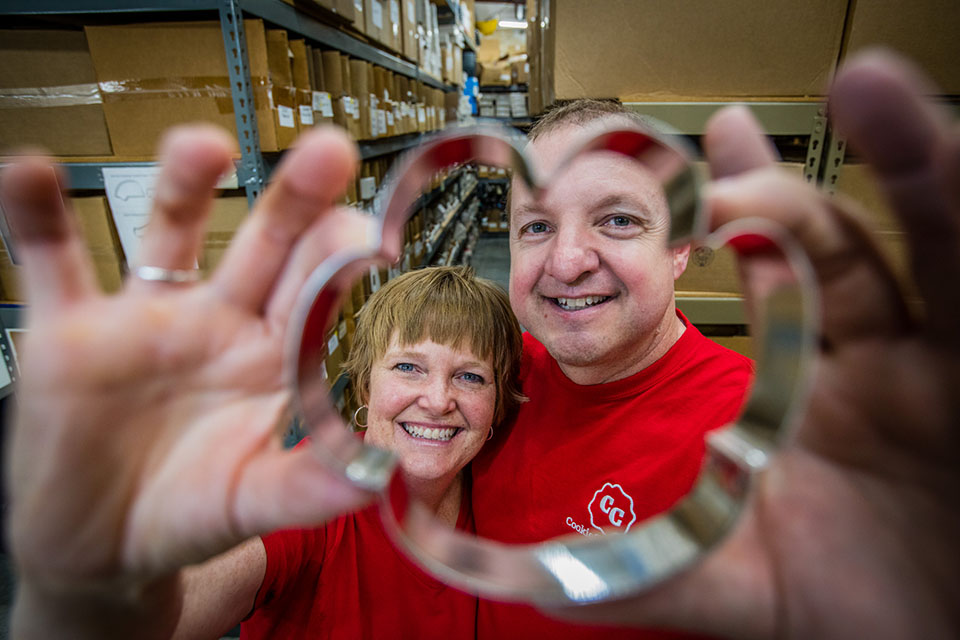
Northwest alumni Joel and Tammy King Hughes are founders and operators of cookiecutter.com, which produces 1,300 unique cookie cutters. (Photos by Todd Weddle/Northwest Missouri State University)
Oct. 1, 2019
The mail-order business Joel ’91 and Tammy King ’90 Hughes started 26 years ago to maximize their family time now makes hundreds of cookie cutters a day and holds the title as the largest cookie cutter supplier west of the Mississippi River.
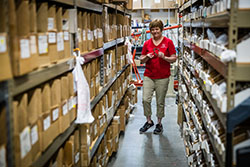
Tammy Hughes walks among the cookie cutter plant's storage area. The Hughes' business offers items for all sizes, shapes and occasions.
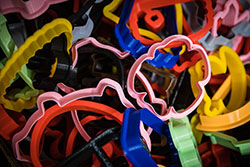
A container holds plastic cookie cutters of multiple colors. The business began making the plastic shapes with 3-D printing technology a few years ago after the Hughes noticed a drop in their sales as competitors began offering plastic shapes.
They founded and operate cookiecutter.com, which makes 1,300 unique cookie cutters in their Pleasant Valley, Missouri, warehouse. In recent years, Woman’s Day, Better Homes and Gardens, Martha Stewart and “Pioneer Woman” Ree Drummond have featured the Hughes family’s cookie cutters.
Joel and Tammy started their careers as teachers but wanted to own a business. So Joel’s mother, who sold H.O. Foose cookie cutters in her Iowa country store, suggested they give it a try. After attending a few craft shows and taking some orders for the cookie cutters, the business took off.
“When we started, it was strictly mail order, the days before computers with internet,” Tammy said. “Then the internet came and we just jumped on cookiecutter.com, which was very good timing for us.”
In 2016, H.O. Foose Tinsmithing Co. – through a strong relationship established with the Hughes family – made Joel and Tammy an offer they couldn’t refuse. The couple purchased the Pennsylvania operation and moved its equipment to their Pleasant Valley, Missouri, warehouse. The deal allowed the family to manufacture the tin cookie cutters on their own and further enhanced their ability to provide one-of-a-kind shapes.
In addition to designing and making the tin cookie cutters, a room of 3-D printers hums with the sound of machines constructing plastic cookie cutters. Joel and Tammy started making the plastic shapes a few years ago after they noticed a drop in their sales and saw the plastic cutters popping up on crafting websites.
“We bought one printer, we ran it at home, and I would have to get up in the middle of the night and restart it,” Joel said. “Then we went to two printers and then three printers, and now we’ve got 15 printers.”
Tammy added, “Everybody wants the new trendy shape, so that’s where the competition is.”
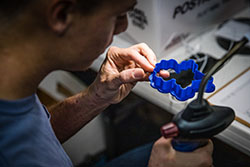
An employee of the Hughes family's cookie cutter business inspects a plastic cutter with a 3-D printer.
With most shapes selling for a $1 or $1.50, cookkiecutter.com offers items for all sizes, shapes and occasions. They have animal shapes – from cows to rats – and shapes representing myriad occupations – from teachers to nurses to police officers. Their biggest seller during last year’s holiday season depicted a fur tree pointing from the back of a truck.
In addition to the shelves of finished cookie cutters, their warehouse holds a library of metal plates with levers and hammer-like pieces arranged in specific patterns. The company has a mold for every shape it produces.
Each cookie cutter begins as part of a coiled strip of steel large enough to produce between 5,000 and 6,000 cookie cutters. The steel is cut into smaller 6 to 12-inch strips, which are then placed, one at a time, on a mold plate. Operated either by hand or with a hydraulic machine, the mold produces a cookie cutter in seconds.
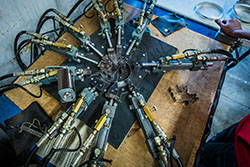
Hydraulic machines at the Hughes family's manufacturing plant shape strips of steel into cookie cutters of all things and a sizes.
“A lot of people don’t realize that every single shape you find in the store has its own pattern,” Tammy said.
While Joel and Tammy employ a staff of about eight people at their manufacturing warehouse, their son, Ty, and daughter, Kala, who is a Northwest student, also have spent time working at the company. The family also enjoys traveling to Maryville on Saturdays during the fall to see Kala perform as a member of the Bearcat Marching Band.
The family holds fond memories of their years at Northwest and the lessons they learned there. Tammy ran with the Bearcat cross country and track and field teams, and Joel also was a member of the Bearcat Marching Band. The couple says they learned the value of hard work through those activities.
“The strategies that we learned through our classes, the problem-solving – that’s why we feel a college degree is beneficial,” Tammy said. “It teaches you how to think, which is necessary in life.”
In addition to cookiecutter.com, the family sells their cookie cutters online through Amazon, eBay and Walmart.